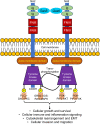Targeting AXL in NSCLC
- PMID: 34408519
- PMCID: PMC8364399
- DOI: 10.2147/LCTT.S305484
Targeting AXL in NSCLC
Abstract
State-of-the-art cancer precision medicine approaches involve targeted inactivation of chemically and immunologically addressable vulnerabilities that often yield impressive initial anti-tumor responses in patients. Nonetheless, these responses are overshadowed by therapy resistance that follows. AXL, a receptor tyrosine kinase with bona fide oncogenic capacity, has been associated with the emergence of resistance in an array of cancers with varying pathophysiology and cellular origins, including in non-small-cell lung cancers (NSCLCs). Here in this review, we summarize AXL biology during normal homeostasis, oncogenic development and therapy resistance with a focus on NSCLC. In the context of NSCLC therapy resistance, we delineate AXL's role in mediating resistance to tyrosine kinase inhibitors (TKIs) deployed against epidermal growth factor receptor (EGFR) as well as other notable oncogenes and to chemotherapeutics. We also discuss the current understanding of AXL's role in mediating cell-biological variables that function as important modifiers of therapy resistance such as epithelial to mesenchymal transition (EMT), the tumor microenvironment and tumor heterogeneity. We also catalog and discuss a set of effective pharmacologic tools that are emerging to strategically perturb AXL mediated resistance programs in NSCLC. Finally, we enumerate ongoing and future exciting precision medicine approaches targeting AXL as well as challenges in this regard. We highlight that a holistic understanding of AXL biology in NSCLC may allow us to predict and improve targeted therapeutic strategies, such as through polytherapy approaches, potentially against a broad spectrum of NSCLC sub-types to forestall tumor evolution and drug resistance.
Keywords: AXL; drug resistance; lung cancer; targeted therapy.
© 2021 Zaman and Bivona.
Conflict of interest statement
T.G.B. is an advisor to Array Biopharma, Revolution Medicines, Novartis, AstraZeneca, Takeda, Springworks, Jazz Pharmaceuticals, Relay Therapeutics, Rain Therapeutics, Engine Biosciences, and receives research funding from Novartis, Strategia, Kinnate, and Revolution Medicines. The authors report no other conflicts of interest in this work.
Figures
References
Publication types
Grants and funding
LinkOut - more resources
Full Text Sources
Research Materials
Miscellaneous



